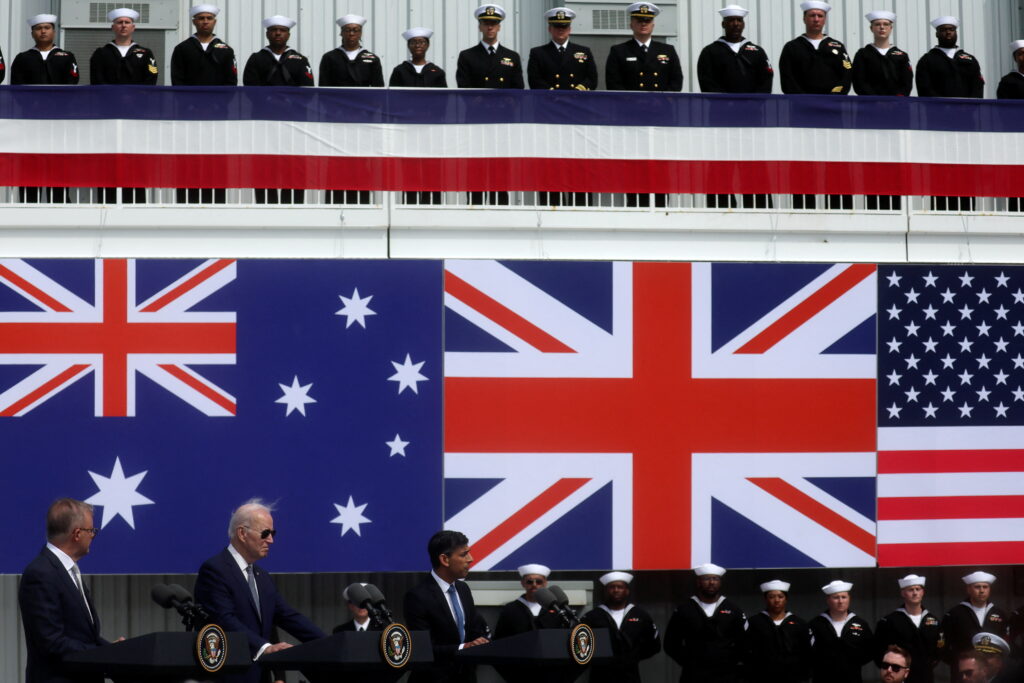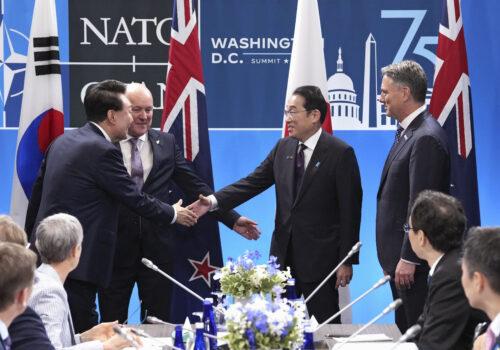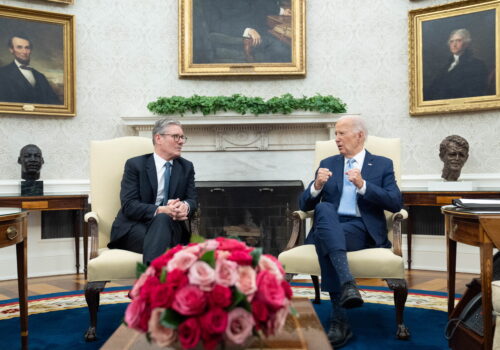On September 15, 2021, the Australia-United Kingdom-United States (AUKUS) trilateral security partnership embraced a new way of deeply integrating defense cooperation—in technology, workforce, industry, and beyond. Upon the partnership’s third anniversary, AUKUS nations continue to strive toward refined, integrated defense and reciprocal defense trade. However, the collective national institutions of the three countries still need to evolve from the Cold War–era model to meet ongoing shifts in global security.
In August, the US Congress received a timely determination from the Department of State officially recognizing Australian and UK export control systems as comparable to those of the United States. It noted that these allies have implemented a reciprocal export exemption for US entities. Effective September 1, the AUKUS-relevant exemptions (22 C.F.R. § 126.7) to the US International Traffic in Arms Regulations (ITAR) mark a welcome and significant step toward a genuine defense industrial and technology alliance among the three partner nations.
Adjustments to the ITAR will allow Australia and the United Kingdom to be effectively granted the same privileged status as Canada within the US defense industrial base. In short, the US Department of State has certified that the export control systems in the United Kingdom and Australia are “comparable” to the export control systems in the United States. This is a significant step worthy of recognition. The ITAR exemption is a much-anticipated change from the regular processes for close US allies. It is a good start and should engender further reform.
However, as I shared at the Oxford AUKUS Dialogue this spring, challenges from US defense export controls remain the most significant barriers to the success of AUKUS. This is primarily due to the lack of a fundamental overhaul to US export control systems since their design in the Cold War. As such, there remain issues with Pillar II implementation of joint development of advanced military capabilities to enhance interoperability and technological integration among the three nations, particularly in electronic warfare, command and control, and artificial intelligence. Even with the latest ITAR reform exemptions, some could inadvertently omit AUKUS-relevant technologies, including those originating in the commercial and dual-use markets.
Current reform efforts will only reach their potential if additional regulatory adjustments are made and there are no lingering barriers to implementation. Indeed, stakeholders in all three nations worry that the enduring structural challenges posed by the ITAR and the exclusion of many AUKUS-relevant technologies from the new US licensing exemption will deadlock cooperation in AUKUS Pillar II and hinder alliance initiatives on precision-guided weapons. Further, present reforms could create an arrangement that omits many AUKUS-relevant technologies, including those originating in the commercial and dual-use markets, from the benefits of export control harmonization.
This is a critical moment for the three nations, and innovative and interoperable trilateral partnerships will be vital to advancing their shared mission. Moving forward, the three allies must collectively commit to tackling the complex issues that still need to be addressed to fulfill the vision of the AUKUS partnership.
For the United States, the focus needs to be on differentiating the applicability of the ITAR to existing US technologies, allied-developed technology, or jointly developed emerging technology through the creation of new exemptions or cooperative programs for AUKUS Pillar II workstreams. Specific areas that could benefit from further reform include, but are not limited to, the following:
Expansion of authorized users: Currently, the ITAR exemption applies to specific “authorized users” within the AUKUS countries. Expanding this list to include more entities could facilitate broader collaboration.
Simplification of licensing procedures: The new rules have expedited some processes, but further simplifying and automating licensing procedures could reduce administrative burdens and speed up approvals.
Inclusion of additional technologies: The current exemption includes a long list of excluded technologies that risks gutting the current ITAR reform. Periodic reviews and updates to this list could ensure that emerging technologies are appropriately covered.
Enhanced cybersecurity measures: As the AUKUS allies focus on advanced technologies, such as cyber capabilities and quantum technologies, implementing robust cybersecurity measures to protect sensitive information is crucial.
Training and compliance programs: Providing comprehensive training and compliance programs for entities involved in AUKUS-related activities can ensure adherence to the new regulations and prevent inadvertent violations.
Considering the critical importance of addressing the growing geopolitical uncertainties and potential conflicts punctuated on this anniversary of the AUKUS pact, it is imperative that policymakers thoroughly examine and harness the full potential of their trilateral security partnership. The United States, in particular, must act swiftly and with enthusiastic readiness to implement the necessary reforms to strengthen the partner nations’ collective security and stability.
R. Clarke Cooper is a nonresident senior fellow with the Atlantic Council’s Scowcroft Middle East Security Initiative and is the founder and president of Guard Hill House, LLC. He previously served as assistant secretary for political-military affairs at the US Department of State.
Further reading
Mon, Jul 8, 2024
Memo to NATO leaders: Why and how NATO countries should engage in the Indo-Pacific
Memo to... By Matthew Kroenig, Jeffrey Cimmino
NATO and its constituent members must bolster cooperation with Indo-Pacific partners and build around existing US efforts to secure the Indo-Pacific region.
Fri, Jul 19, 2024
How to institutionalize NATO’s cooperation with its closest Pacific partners
New Atlanticist By Ira Straus, Francis Shin
NATO and its IP4 partners—Australia, Japan, New Zealand, and South Korea—should establish an Atlantic-Pacific Partnership Forum (APPF) to advance their cooperation.
Thu, Sep 12, 2024
As Starmer visits the White House, the US-UK ‘special relationship’ must look forward
New Atlanticist By Peter Westmacott
The UK prime minister’s meeting with the US president this week comes after a recent flurry of diplomatic activity between their countries, but more will be needed ahead.
Image: US President Joe Biden, Australian Prime Minister Anthony Albanese and British Prime Minister Rishi Sunak deliver remarks on the Australia - United Kingdom - US (AUKUS) partnership, after a trilateral meeting, at Naval Base Point Loma in San Diego, California U.S. March 13, 2023. REUTERS/Leah Millis



